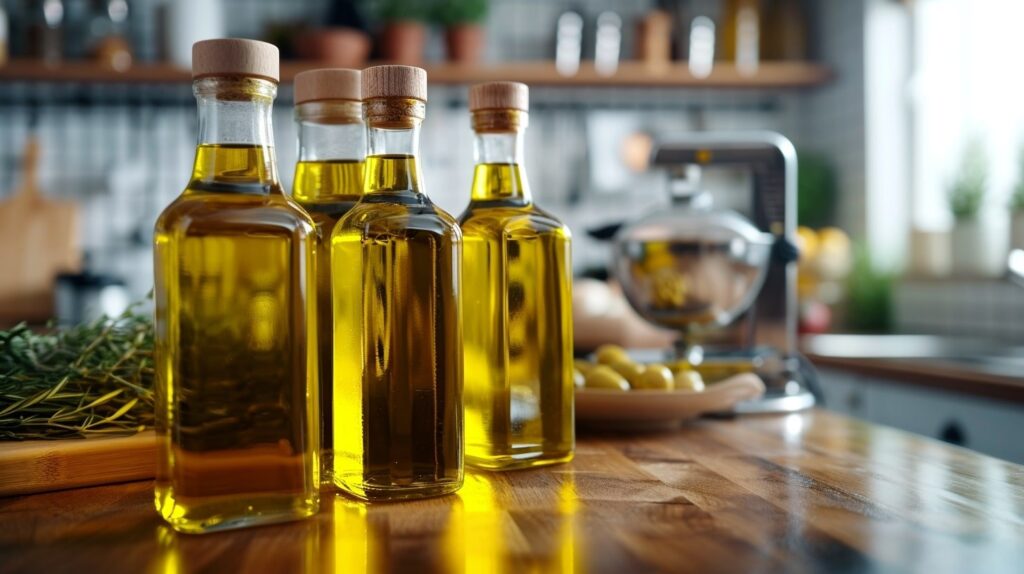In the quest for a healthier heart and a more vibrant lifestyle, the types of fats we incorporate into our diet play a pivotal role. The mantra “Use cooking oils wisely” is not just a passing trend, but a fundamental component of a heart-healthy diet. With a shift from saturated fats like butter to healthier oils such as olive oil or canola oil, we can significantly improve our cardiovascular health. These oils are abundant in monounsaturated and polyunsaturated fats, which are the allies of a healthy heart. However, it’s crucial to remember that all fats are calorie-dense, so moderation is key. Let’s dive into the world of heart-healthy oils and discover how to balance flavors and calories for optimum health. And for those who are serious about taking their heart health to the next level, the ‘My Heartlet’ app offers a plethora of resources to keep you on track.
Table of Contents
Embrace Heart-Healthy Oils!
The journey towards better health begins with making informed choices about the fats we use in our cooking. Olive oil, renowned for its role in the Mediterranean diet, is a prime example of a heart-healthy oil. Its high content of monounsaturated fats has been linked to reduced risk of heart disease. Similarly, canola oil, with its lower levels of saturated fat and higher levels of omega-3 fatty acids, is another excellent choice for those looking to protect their heart.
But why exactly are these oils better for you? Studies have shown that monounsaturated and polyunsaturated fats help to lower bad cholesterol levels, thereby reducing the risk of heart disease and stroke. Furthermore, these fats can also provide essential nutrients that your body needs to function properly.
Despite the benefits, it’s essential to understand that not all oils are created equal. For instance, oils like coconut oil and palm oil, although popular in certain cuisines, are high in saturated fats and should be used sparingly. By choosing oils that are better for heart health, you’re taking a significant step towards a healthier you.
Balance with Mono & Poly Fats!
The balancing act of including the right types of fats in your diet can seem daunting, but it’s simpler than you might think. Monounsaturated fats (MUFAs) and polyunsaturated fats (PUFAs) are the cornerstones of a heart-healthy diet. Foods rich in MUFAs, like avocados and nuts, along with oils such as olive and canola, can help maintain healthy cholesterol levels. On the other hand, PUFAs found in fish, flaxseeds, and walnuts, including omega-3 and omega-6 fatty acids, play a crucial role in brain function and cell growth.
However, it’s not just about the type of fat but also the quantity. While MUFAs and PUFAs are beneficial, they should be consumed in moderation due to their high caloric content. The American Heart Association recommends that the majority of the fats you eat should be either monounsaturated or polyunsaturated. When you do use fats, choose natural sources like nuts, seeds, and vegetable oils rather than processed foods.
To make it easier to incorporate these fats into your diet, here are some simple tips:
- Use olive oil as a salad dressing or for low-temperature cooking.
- Add slices of avocado to your sandwiches or salads for a MUFA boost.
- Snack on a small handful of nuts instead of chips or candy.
- Include fatty fish like salmon in your meals twice a week for a dose of PUFAs.
- Experiment with flaxseed oil in smoothies or drizzled over cooked vegetables.
Savor Flavor, Watch Calories!
While it’s important to focus on the health benefits of monounsaturated and polyunsaturated fats, it’s equally important to remember that they are still fats. They come with a high calorie count, so portion control is crucial. Using oils wisely means enjoying their flavors and health benefits without overindulging.
One way to keep track of your fat intake is to measure your oils before adding them to dishes. A teaspoon of oil is often all that’s needed to sauté vegetables or dress a salad. Additionally, consider methods of cooking that require less oil, such as baking, steaming, or grilling.
Remember that the goal is to enhance the natural flavors of your food, not to overwhelm them with oil. By being mindful of the amount you use, you can savor the delicious flavors while keeping your calorie intake in check. For those who need guidance on managing their diet, the ‘My Heartlet’ app can be a great resource for tracking your food intake and keeping your heart health on the radar.
The path to a heart-healthy lifestyle is paved with wise choices, particularly when it comes to the fats we use in our kitchens. By embracing oils that are rich in monounsaturated and polyunsaturated fats, we can protect our hearts and enhance the flavors of our favorite dishes. Balance is essential; enjoy the benefits of these healthy fats while being mindful of their caloric content. Let the ‘My Heartlet’ app be your companion in this journey, providing you with the tools and information needed to make smart, health-forward decisions. Remember, a happy heart is the result of a balanced diet and a life lived with joy and moderation.
